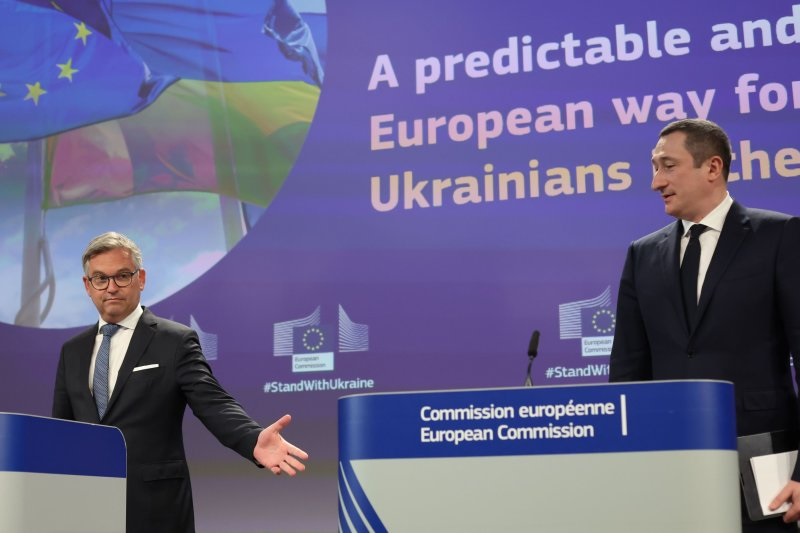The European Commission, on Wednesday, June 4, 2025, proposed a significant extension of the EU’s Temporary Protection Directive, aiming to support over 4 million Ukrainian refugees.
According to media sources, these are Ukrainian refugees who fled to the European Union following Russia’s full-scale invasion of Ukraine in February 2022.
The proposed extension would allow displaced Ukrainians to legally remain in the EU until March 2027.
This supposedly ensures continued access to vital services and legal protections as the war continues.
Continuation of Temporary Protection
The Temporary Protection Directive was originally activated in March 2022 to respond rapidly to the influx of Ukrainian refugees.
It granted beneficiaries the right to live and work in the EU, as well as access to healthcare, housing, education, and social welfare.
Since then, the directive has been extended several times, and the latest proposal would further prolong these protections until March 2027.
The European Commission estimates that 4.3 million Ukrainians are currently benefiting from this protection, with approximately one-third of them being children.
Beyond Temporary Measures: Long-Term Solutions
While reaffirming the EU’s commitment to protect Ukrainian refugees, the Commission also stressed the importance of moving beyond short-term support.
It is encouraging member states to help Ukrainians transition into more permanent legal statuses, such as work or student visas, for those intending to stay longer.
This transition could provide greater security and integration opportunities for displaced individuals.
Furthermore, the Commission is calling on member states to establish voluntary return programs, which would include support for exploratory visits to Ukraine.
Such visits would allow refugees to assess living conditions and employment opportunities before deciding to return permanently.
EU Commissioner for Home Affairs, Magnus Brunner, clarified that any decisions to end temporary protection would be made collaboratively with Ukraine and only when the situation there has stabilized.
Ukraine’s Efforts to Encourage Repatriation
The Ukrainian government is also preparing for the eventual return of its citizens.
Plans are underway to create “unity hubs” in European cities with significant Ukrainian populations, including Berlin, Prague, and Alicante.
These centers will provide guidance on returning to Ukraine and offer assistance for reintegration into Ukrainian society.
Deputy Prime Minister Oleksiy Chernyshov emphasized the crucial role returning Ukrainians could play in rebuilding the country’s post-war economy.
He stated that to achieve the realistic goal of doubling the Ukrainian economy within a decade of peace, the nation would need an estimated 4 million additional workers.
He underscored that a strong economy and democratic governance are key to Ukraine’s long-term prosperity and successful EU integration.
Financial Backing from the EU
To facilitate the ongoing support and eventual repatriation of Ukrainian refugees, the European Commission has announced €4 billion in new funding.
This comes in addition to the €15 billion already distributed to EU member states since 2022.
These funds are intended to assist host countries in managing the needs of Ukrainian refugees, including housing, employment, education, and return logistics.
Persistent Challenges and Shifting Public Sentiment
Despite this extensive support, challenges remain.
Some EU countries have introduced new pathways to long-term residency.
For instance, the Czech Republic now allows Ukrainians who meet certain income and residency criteria to apply for long-term permits.
Poland on the other hand, offers a three-year residence option for those who have had temporary protection for at least one year.
However, these alternative options often come with fewer benefits and more stringent requirements, which may deter applicants.
Public support for Ukrainian refugees, while still high, has declined since the initial invasion.
According to Eurobarometer surveys, support dropped from 88% in early 2022 to 71% by February 2024.
This shift in sentiment reflects growing pressure on EU governments to balance humanitarian aid with domestic political considerations.
Conclusion
The European Commission’s proposal to extend temporary protection until March 2027 underscores the EU’s sustained commitment to aiding Ukrainian refugees amid ongoing instability.
While the extension provides much-needed legal clarity and support, the emphasis is also on enabling longer-term solutions.
Emphasis is further on preparing for eventual voluntary returns.
Success will depend on continued collaboration between EU institutions, member states, and the Ukrainian government.
This is expected to meet the evolving needs of displaced Ukrainians and ensure their safe and dignified reintegration into their homeland when conditions allow.







